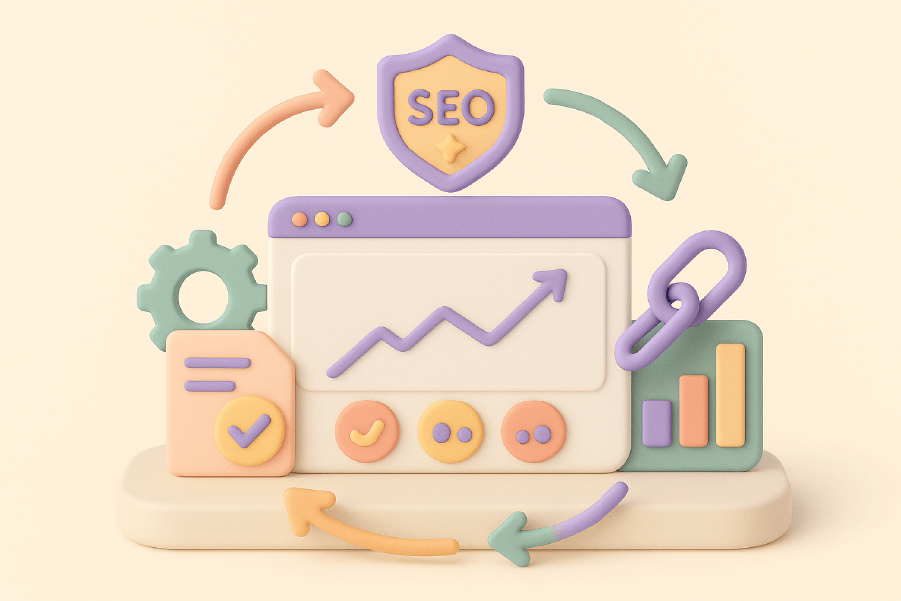A startup’s brand is essential for any startup looking to stand out in a crowded market. This article will guide you through effective strategies for branding for startup businesses. Whether you’re defining your identity, creating a compelling brand story, or avoiding common pitfalls, you’ll find crucial tips to ensure your startup’s success.
Key Takeaways

Effective startup branding establishes a distinct identity, builds customer loyalty, and requires ongoing evolution.

Key elements of a strong brand identity include consistent voice, visual elements, and clearly defined brand values that foster recognition and trust. A brand’s identity is crucial as it builds trust, attracts stakeholders, and fosters team cohesion.

Early-stage branding provides a competitive edge and lays the foundation for future marketing efforts, ensuring a startup stands out in a crowded marketplace.
Understanding Startup Branding

Startup branding involves creating a distinct identity for a new business. It is a strategic process that requires careful planning and execution. It establishes a unique market presence and fosters customer loyalty. Branding is not just about aesthetics; it reflects and unites a startup’s brand values, practices, and purpose. Differentiation is necessary in the crowded startup ecosystem. A strong brand identity ensures your startup stands out and remains memorable to customers.
A well-defined startup’s brand identity can significantly enhance a startup’s chances of being remembered by customers. Branding is a continuous process that evolves with the business. Effective startup branding helps convey the company’s mission and core values, building trust and distinguishing your startup from competitors.
Ultimately, branding for startups aims to craft an identity that resonates, builds trust, and distinguishes a startup brand in a crowded market, which is where a startup branding agency can play a crucial role.
Key Elements of a Strong Brand Identity

A strong brand identity communicates your startup’s vision, values, and unique selling proposition cohesively. Key elements include a consistent brand voice, visual identity elements such as logos, colors, and typography, and clearly defined brand values. Together, these components create a memorable and recognizable brand identity.
A consistent brand voice connects deeply with your audience and represents the brand’s personality. Logos, colors, and typography should match the brand personality to enhance recognition. When these visual elements are consistently used across different platforms, they help build a strong brand presence and immediate brand recognition.
Brand values are the traits that characterize how your business operates and inform its interactions with customers. These values should be reflected in every aspect of your branding strategy, from your brand’s voice to the visual elements that convey the brand’s personality. A well-crafted brand identity not only attracts customers but also fosters loyalty and trust.
The Importance of Early Branding Efforts
Early-stage branding provides a competitive edge against both new startups and established brands. By creatively differentiating your startup’s brand, you avoid blending in with competitors. Investing in quality branding early on crystallizes your startup’s purpose, making it easier to attract investors, talent, and customers.
A well-defined brand attracts customers, partners, and investors while distinguishing your startup from competitors. Effective branding creates a positive impression, builds loyalty, and increases conversion and sales. This initial investment in branding pays off by providing a solid foundation for future marketing efforts and overall business growth.
Brand positioning is another crucial aspect of early branding efforts. It influences how customers perceive and differentiate your brand, aiding in overall market presence. Prioritizing branding from day one helps establish a strong market presence and ensures that your startup stands out in a crowded marketplace.
Developing a Compelling Brand Story

A well-crafted brand story, which is an integral part of your brand’s identity, enhances marketing effectiveness and fosters future growth. A strong brand narrative should clearly express your company’s purpose, showcasing the problem it resolves for customers. This story should follow a structure highlighting the problem, the solution offered by your product, and the positive results for customers.
Emotional resonance is crucial in a brand story. It helps attract potential customers who identify with your message. Character development within your brand story creates relatable figures that potential customers can connect with. This connection fosters trust and loyalty, making customers more likely to choose your brand over competitors.
The uniqueness of your brand story should reflect your competitive advantages and differentiators in the market. Successful brand storytelling can significantly enhance customer trust and engagement, especially for early-stage startups. Incorporating suspense and intrigue keeps your audience engaged and eager for more information.
Defining Your Target Audience
Identifying your ideal consumer is crucial for tailoring branding and marketing strategies effectively, as it directly influences your startup’s brand identity. A well-defined target audience ensures impactful branding and messaging that resonates. Segmenting target audiences allows you to develop specific marketing materials that connect with shared interests. Creating buyer personas helps represent ideal customers based on their demographics and behaviors.
Understanding consumer behavior is key to aligning branding efforts with marketing strategies. An outstanding customer experience is vital for reflecting brand values across all interactions. Effective marketing channels vary by audience demographics, with younger consumers often favoring social media.
Many startups fail to understand their customers and competitors, resulting in offerings that do not meet market needs.
Creating Consistent Branding Across Platforms
Building credibility requires consistency. It sustains that credibility over time. It ensures customers recognize and trust your brand across all interactions. Inconsistent branding can lead to difficulties in customer connection and reduced brand recall, negatively impacting overall business performance. A cohesive brand identity helps startups stand out in competitive markets where products may appear similar.
Defining your brand’s personality and maintaining a consistent tone and voice across all platforms reinforce customer perception and build emotional connections. Templates and brand guidelines maintain uniformity in branding across various teams and platforms.
All marketing materials should align with the brand identity to present a unified front.
Leveraging Visual Identity for Market Impact

Visual identity components include your logo, color scheme, and typography, which are crucial in enhancing your startup’s brand identity. These elements serve as the visual representation of your brand and communicate its values and personality quickly to consumers. Colors used in branding are linked to specific emotions, influencing consumer perceptions and fostering emotional connections.
Consistent visual branding across platforms reinforces brand recognition and builds trust with consumers. Successful brands often update their logos to stay relevant while maintaining a cohesive visual identity. By leveraging your visual identity effectively, you can create a strong brand presence and immediate brand recognition.
Visual elements should adapt to different platforms, ensuring a strong presence regardless of the medium. Every touchpoint should reflect your startup’s brand values and promise a positive experience to enhance customer engagement. When branding is inconsistent across touchpoints, it dilutes brand recognition and weakens customer trust.
Building a Strong Brand Experience
A strong brand experience is essential for creating a lasting impression on customers. It encompasses every interaction a customer has with your business, from visiting your website to engaging with customer service. A well-designed brand experience can significantly build trust and loyalty among your customers.
Consistency is key. Your brand experience should be uniform across all touchpoints, including social media, email, and your website. This consistency helps reinforce your brand’s identity and ensures that customers have a seamless experience, no matter how they interact with your business.
Reflecting your business’s values and mission in every customer interaction is crucial. This not only differentiates your business from competitors but also fosters a deeper connection with your audience. A brand experience that aligns with your brand values and mission can create a strong emotional bond with customers, encouraging repeat business and advocacy.
Regularly reviewing and updating your brand experience is vital to ensure it remains relevant and effective. As your business evolves, so should your brand experience. This ongoing refinement helps maintain a strong brand presence and keeps your customers engaged and satisfied.
Working with Branding Agencies
Collaborating with a branding agency can be highly beneficial for businesses aiming to create a strong brand identity. A branding agency brings expertise and guidance on developing a comprehensive branding strategy and visual identity, ensuring your brand stands out in the market.
A branding agency can help craft a unique and compelling brand story that resonates with your target audience. They assist in defining your brand positioning and enhancing brand recognition, making it easier for potential customers to identify and connect with your brand.
Support from a branding agency extends to your marketing efforts, helping you reach potential customers more effectively. They can aid in creating a strong brand personality and brand voice that aligns with your brand values and resonates with your audience.
Branding agencies also provide valuable guidance on establishing brand guidelines, ensuring consistency across all branding and marketing materials. This solidified brand identity helps maintain a cohesive and professional image, crucial for long-term success.
By working with a branding agency, businesses can leverage professional expertise to create a robust and impactful brand identity, setting the foundation for sustained growth and success.
Avoiding Common Branding Mistakes
In-depth audience research, defined values, and strong value propositions build a strong brand’s identity. Common pitfalls for startups include sourcing branding items from various suppliers or attempting to do it themselves without proper guidance. This can lead to a fragmented brand identity and dilute its effectiveness.
Third parties misinterpreting your brand can create a disconnect from your startup’s essence. Over-reliance on external agencies during initial branding can lead to a lack of authentic brand ownership. Aim for continuous improvement rather than a perfect solution on the first try, especially in Phase 2 of branding. Branding requires ongoing research and optimization to stay relevant.
Avoid using cheap logo maker websites for creating a brand identity as it can detract from professional perception. Minimizing common branding mistakes helps maintain a clear and effective brand strategy. Awareness of these pitfalls helps build a strong and consistent brand presence.
Using Customer Feedback to Refine Your Brand
Seeking and analyzing customer feedback refines your startup’s brand strategy and messaging. This helps build a brand that customers can relate to. It also promotes loyalty and trust. Regular brand audits track consistency, alignment with business practices, and customer perception. Conduct brand audits every six months or annually to stay relevant.
Incorporating audience feedback into branding and marketing strategies drives product improvements. An effective way to showcase customer experiences is to share customer testimonials and case studies. By continuously refining your brand based on customer feedback, you can ensure it remains relevant and resonates with your target audience.
Integrating Branding with Marketing Strategy

A clear brand mission and vision guide growth and decision-making. Not establishing a clear marketing strategy often leads to wasted resources on ineffective campaigns. A multichannel marketing approach effectively communicates brand messages. Collaborative marketing initiatives amplify your startup’s brand reach and credibility.
Neglecting to measure and adjust marketing performance results in missed opportunities for improvement. Not utilizing online marketing channels effectively can prevent startups from reaching their target audience cost-efficiently.
Integrating branding services with your marketing strategy and defining your brand’s personality ensures a cohesive and impactful approach to reaching your audience.
Tools and Resources for Effective Branding
The right tools significantly enhance your startup’s brand identity and overall branding efforts, making them more efficient and impactful. Canva offers a user-friendly platform for creating various visual content, including social media graphics and presentations. Unsplash provides a vast collection of high-resolution images for free, enhancing visual branding without copyright concerns.
Coolors is a color scheme generator that assists startups in developing their visual identities. Buffer allows users to manage social media channels from a single interface, facilitating content planning and audience engagement. Slack is a messaging platform that facilitates communication within teams and with clients, known for its ease of use.
Other useful tools include Dropbox for file storage and sharing, Twilio for customer communication, Toggl for time-tracking, Asana for project management, and IFTTT for task automation. Segment acts as a customer data platform, enabling better targeting and personalization by collecting and organizing data. By leveraging these tools, you can streamline your branding efforts and enhance your startup’s overall effectiveness.
Summary
Effective branding, which includes developing a strong brand’s identity, is a cornerstone of startup success. By understanding the key elements of a strong brand identity, prioritizing early branding efforts, and developing a compelling brand story, startups can establish a unique market presence and foster customer loyalty. Defining your target audience and creating consistent branding across platforms further enhances your brand’s impact.
Avoiding common branding mistakes, using customer feedback to refine your brand, and integrating branding with your marketing strategy are crucial for long-term success. Leveraging the right tools and resources can make your branding efforts more efficient and impactful. By applying these strategies, your startup can build a strong, recognizable, and successful brand.
Frequently Asked Questions
Why is early branding important for startups?
Early branding is crucial for a startup’s brand as it offers a competitive edge, attracts investments, and helps establish a strong market presence. Developing a clear brand identity from the outset can significantly influence your startup’s success.
How can I create a compelling brand story?
To create a compelling brand story, focus on a narrative that outlines the problem you address, presents your solution, and showcases the positive outcomes, all while evoking emotional resonance and character development. This approach will engage your audience and strengthen your brand’s identity and connection.
What are the key elements of a strong brand identity?
A strong brand identity is built on a consistent brand voice, a well-defined brand’s personality, visual identity elements such as logo and colors, and clearly defined brand values. These components work together to create a cohesive and recognizable presence in the market.
How can customer feedback refine my brand?
Customer feedback is essential for refining your startup’s brand, as it builds loyalty and trust by aligning your offerings with customer needs. Conducting regular brand audits will help ensure your brand remains relevant and connected to your audience.
What tools can aid in effective branding?
Effective branding, crucial for a startup’s brand identity, can be significantly enhanced using tools like Canva for design, Unsplash for high-quality images, and Buffer for social media management. These resources streamline processes, allowing for a more cohesive and efficient branding strategy.






